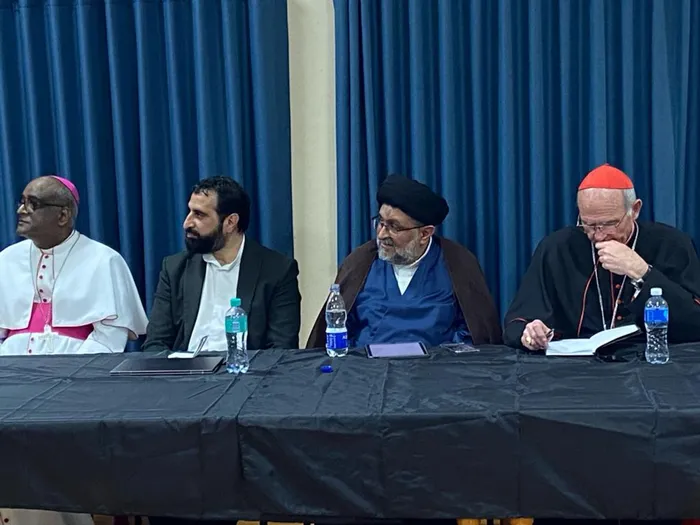For peace in Palestine and SA, there must be justice

Picture: The Southern Cross @ScrossZA / X (formerly Twitter) / Posted on November 25, 2023 – The Archdiocese of Cape Town with the Ahlul Bait Mosque hosted the 4th meeting of the Platform of Theological Dialogue and Practical Ethics at Christ the King parish in Pinelands. The main speakers were Dr Sayad Dariyababi and Father Wim Lindeque.
By Wesley Seale
As the ceasefire was commencing in Gaza, thousands of kilometres away in the most southern city in Africa a group of Catholics and Muslims had gathered again for the fourth meeting of the Platform for Theological Dialogue and Practical Ethics.
The patrons of the platform are the Roman Catholic Archbishop of Cape Town, Stephen Cardinal Brislin, and Moulana Syed Aftab Haider from the Ahlulbait Mosque Complex in Ottery.
The theme for the evening was “Faith, Justice and the Struggle for Change” and the new cultural attaché of the embassy of the Islamic Republic of Iran, Dr Sayed Mostafa Daryabari, was one of the keynote speakers.
Emphasising the importance of justice, Daryabari quoted Imam Ali (peace be upon him), son-in-law of the prophet of Islam (peace be upon him), when he insisted on the superiority of justice over generosity.
This is for two reasons. Firstly, Imam Ali (pbuh) said: “Justice puts things in their proper place and generosity diverts them from their natural direction.” Second, he stated that “justice is the general caretaker, whereas generosity is a particular reliever”.
In Catholic thought, there is a similar theme articulated by St Augustine of Hippo when he said: “Charity is no substitute for justice withheld.”
For the Slovenian philosopher, Slavoj Žižek, justice withheld is objective violence of which the physical violence we witness is only a fruit. In other words, for Žižek the war on Palestine, both in the Gaza and the West Bank, as well as the rampant crime and the violence of corruption in South Africa are only the fruits or results of the objective violence that exists in these societies.
The objective violence is justice withheld.
The Archdiocese of Cape Town with the Ahlul Bait Mosque hosted the 4th meeting of the Platform of Theological Dialogue and Practical Ethics at Christ the King parish in Pinelands. The main speakers were Dr Sayad Dariyababi and Fr Wim Lindeque. pic.twitter.com/OHNwjw6CXB
— The Southern Cross (@ScrossZA) November 25, 2023
Therefore, often many people only complain and decry the physical violence that they witness: the genocide, ethnic cleansing, war, violent crime and corruption but they do not understand that these are only the symptoms of the objective violence that Palestinians and South Africans have had to endure for over the last 30 to 76 years.
Instead, in both instances, the vast majority of South Africans as well as Palestinians have simply been rewarded with charity and not justice.
In the case of Palestinians, they have had to suffer nearly eight decades of injustice but have been forced to be satisfied with the charity of a Bantustan system in the Occupied Territories.
The charity of a two-state solution has been imposed on Palestinians, by the international community, on land which was and remains theirs.
Yet one wonders why advocates of the two-state solution today did not demand the same in South Africa 30 years ago.
Over and over again, Palestinians are reminded of the aid, the charity, they receive from across the world. Frequently, when life under injustice becomes too much for them and we see an explosion or an escalation of the violence, as we did on October 7, the first thing the international community threatens to withhold is the charity; cutting the aid.
Violent crime, especially against women and children, corruption, poverty and inequality are rampant in South Africa precisely because the injustice of the past is denied; whether explicitly or implicitly.
The formerly oppressed of South Africa must be satisfied with the charity of government and non-governmental organisations while the injustice of the theft of land and mineral resources to benefit a few and economic exploitation continue.
Our unjust economy and especially business continues to promote exploitation and continues to put profit before people. Yet South Africans must be satisfied with the charity of exploitative jobs.
Recalling the words of Pope Paul VI is useful: “If you want peace, work for justice!” If we want peace in Palestine and South Africa, we must first insist on justice.
Seale has a PhD in international relations and is a practising Roman Catholic
Related Topics: